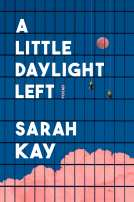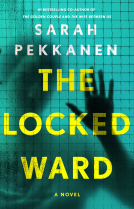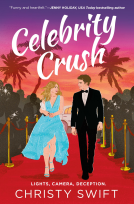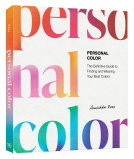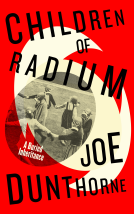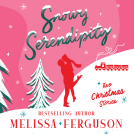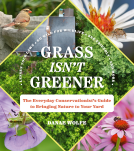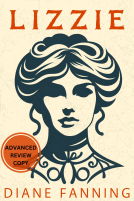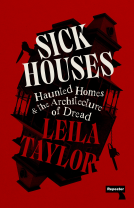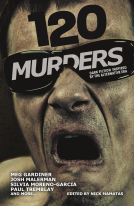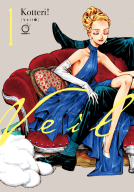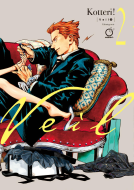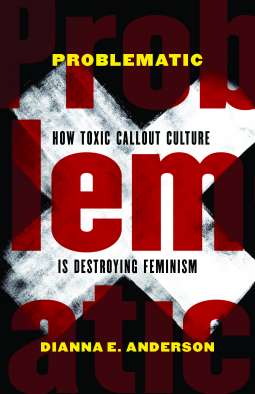
Problematic
How Toxic Callout Culture Is Destroying Feminism
by Dianna E. Anderson
This title was previously available on NetGalley and is now archived.
Send NetGalley books directly to your Kindle or Kindle app
1
To read on a Kindle or Kindle app, please add kindle@netgalley.com as an approved email address to receive files in your Amazon account. Click here for step-by-step instructions.
2
Also find your Kindle email address within your Amazon account, and enter it here.
Pub Date Sep 01 2018 | Archive Date Oct 31 2018
University of Nebraska Press | Potomac Books
Talking about this book? Use #Problematic #NetGalley. More hashtag tips!
Description
Dianna E. Anderson’s incisive Problematic takes on the stereotype of the perpetually dissatisfied feminist. Too often feminist criticism has come to mean seeing only the bad elements of women-centric pop culture and never the good. Anderson suggests that our insistence on feminist ideological purity leads to shallow criticism and ultimately hurts the movement. Instead, she proposes new, more nuanced forms of feminist thought for today’s culture, illustrated by examples from across the spectrum of popular music, movies, and TV, including Lena Dunham, Nicki Minaj, and even One Direction. While grounding her inquiry in pop culture media and topics, Anderson draws on concepts of feminist theory to show how we can push for continued cultural change while still acknowledging the important feminist work being done in the pop culture sphere today.
Advance Praise
“It’s never been easier to consume popular culture or trickier to thoughtfully engage it without messing up: you have to like (or condemn) all the right things and for all the right reasons. But those arguments around Beyoncé or the Oscars get so heated because pop culture is where we affirm and, yes, perform, our public values. Anderson illustrates precisely why those political stakes require us to envision a post-‘callout’ world where we can stay critically engaged in the discourse on movies and sports and music—perhaps especially when it comes to the stuff we’re not supposed to like.”—Gene Demby, host of NPR’s Code Switch
“Problematic is a necessary contribution to a crucial current debate—a sustained, thoughtful argument for engaging with the compromised, the difficult, and, yes, the problematic in contemporary popular culture.”—Angus Johnston, historian, professor at City University of New York, and advocate for student rights
“In a time when everyone is swinging sledgehammers, Dianna Anderson comes at our feminist discourse with a scalpel, taking on some of the most bitterly polarized and polarizing figures of our time with nuance and care. Even if you think you physically can’t bear to read another essay about Iggy Azalea or Girls, you need to read hers.”—Sady Doyle, author of Trainwreck: The Women We Love to Hate, Mock, Fear . . . and Why, and founder of Tiger Beatdown
“In Problematic Dianna Anderson takes the reader back to feminist theory 101, walking the long-dedicated and newly recruited among us alike through the often risky process of consuming popular culture with a critical eye. Along the way she teaches us to hold on to the joy of those things that can, at times, fall short of perfection.”—Katie Klabusich, writer, reproductive justice advocate, and host of Netroots Radio’s The Katie Speak Show
“This work is necessary right now, especially in this particular moment (a Trump presidency and in a #MeToo world). It is hard to read Problematic and not come away concerned that a feminist critique of pop culture is both required in today’s society and struggling under the weight of its own righteousness . Anderson doesn’t want feminists to stop being critical of the world around them; she’s just asking that they be more thoughtful about how they do it. Problematic can serve as an example of how to do exactly that.”—Jessica Luther, author of Unsportsmanlike Conduct: College Football and the Politics of Rape
Available Editions
| EDITION | Other Format |
| ISBN | 9781612349619 |
| PRICE | $24.95 (USD) |
| PAGES | 200 |
Featured Reviews
 Cristie U, Book Trade Professional
Cristie U, Book Trade Professional
This was a very timely read and extremely well written. Many of us consider ourselves to be feminists, but our actions don’t reflect it. This book discusses the dissatisfaction society feels feminists carry around despite the progress they make.
I frequently read books on feminism, race relations, and other social justice issues--so when I received a digital, advanced reading copy of Problematic: How Toxic Callout Culture is Destroying Feminism by Dianna E. Anderson, I was excited to dig in!
Problematic, which will be released September 1st, dives into the current "callout culture" within feminism and feminist critique. Even I've sometimes struggled with adding my thoughts in public forums--whether that is on Twitter or in personal conversations--for fear of saying the wrong thing and having to deal with the guaranteed wave criticism. Anderson eloquently describes how modern feminism is often too quick to jump to overwhelming criticism, without taking time to analyze the situation--all in the quest for perfection.
She frequently uses feminist theory to explain how this "callout culture" has maybe gone to far. I took a graduate-level feminist theory course, but am confident that anyone could easily read and understand Anderson's work; while Anderson does mention her academic background and influence, she uses real, pop culture references, like the Minaj vs Cyrus feud, the Swift vs West feud, Girls and Lena Dunham, #GamerGate and video game world, and the ever-enthusiastic Leslie Knope, to make her arguments easy to understand, enlightening, and entertaining.
Beyond her writing style--just a quick thank you to Dianna E. Anderson; she was able to verbalize the fear that so many activists face. Activism, advocating and justice are a constant developmental journey--you never "arrive." Everyone is always learning more about society and cultural issues, about systems of oppression and how we either support or dismantle those systems. And yet, fearing this level of unrelenting and, sometimes, life-altering criticism frequently stops people from speaking up and speaking out.
 Sandra K, Reviewer
Sandra K, Reviewer
Although I consider myself a feminist, I have never felt comfortable claiming the identity. This book explains why. Weaving together meta-analysis of popular culture with feminist theory, the author explores the impact of "perfectionism" on the practice of feminism in the world today. Claiming feminist identity in the current social media-driven world is a dangerous act because it makes one a target for other feminists who seem to collect points for pointing out what someone else is doing wrong ("problematic") and blacklisting them in place of engaging in honest conversations about the impact of various actions. This book offers not only warnings about the ways call-out culture damages the fight for equality but suggestions for how to counter it. If this is the feminism of the future, you can sign me up.
Problematic reads like a collection of essays covering various ways that "callout culture" is affecting the feminist movement and people in general. Using different examples from popular culture, Anderson points out that common criticisms leave no room for an imperfect feminist. Because various subgroups within the feminist movement spend more time criticizing those imperfections among members of other subgroups, momentum is lost and opportunities to work together are lost.
I appreciated some of the examples more than others, partly because I was more familiar with certain stories/controversies than others. At times I felt like certain things were over-explained (and not just on the topics I was already more familiar with), but then I needed to do some research outside of the book to understand other topics. I would have appreciated a more consistent method of summarizing the various real-life examples that are used, and I would have loved for there to have been more dates -- I have no clue how old this author is, so references she makes to certain points in her life would be clearer if she used actual years.
Those quibbles are relatively minor, though, and overall I found this to be an informative read and an interesting perspective to think about.
Thank you to NetGalley and University of Nebraska Press for providing me with a DRC of this book.
The lack of nuance in feminist critique has become…problematic. This is what Dianna E. Anderson posits in her new book, Problematic: How Toxic Callout Culture is Destroying Feminism. While the “destroying” in the title is, ironically, a bit lacking in the subtle critique she’s encouraging, Anderson’s argument is a compelling one.
In a series of essay case studies in media criticism, Anderson shows how many feminists have latched on to “problematic” as a catch-all term for “imperfect.” The thing is, humans are not perfect and neither is their art; the foundation of Problematic is the idea that feminism and progressive politics have allowed the perfect to become the enemy of the good. Anderson’s work isn’t a diatribe against negative criticism—feminists can and should call out bias, laziness, and any other failings in art. Rather, her argument is for greater engagement and a rejection of the mob mentality that is encouraged by criticism on the internet. Engaging critically with the world is vitally important. But to do so with real integrity and meaning is to also make allowances for the inevitable failings of art and artists.
Engaging in meaningful criticism also means understanding our own limitations when it comes to consuming culture and acknowledging that we cannot experience everything with the depth required for legitimate critique. Lack of time, an overwhelming variety and volume of media, and shifting perspectives about feminism in the 21st century have contributed to many feminists feeling pressure to address everything—every buzzworthy show, book, public figure, musical performance—regardless of experience, understanding, or even personal interest. This means cursory glances at anything from Lena Dunham’s career to the latest Lady Gaga album gets assessed at lightning speed—and often written off as “problematic” just as quickly. Problematic analyzes criticism in a similar way to Andi Zeisler’s take on the intersection of capitalism and feminism in We Were Feminists Once, an approach in which the goal is not to offer an overt solution, but to compel an examination of a flawed system and allow the reader to figure out the rest.
(This review appears in print-only form in Herizons Magazine (Canada), Fall 2018)
 Beth B, Reviewer
Beth B, Reviewer
Just an incredibly thought-provoking look at popular culture, feminist critique, and what it means to be human and be real and trying to be better and honest and understanding of ourselves and others. A couple times the essays veered off into the weeds a bit and will probably lose people who aren't into the "academic"-ness, but overall, this was really well done.
Dianna E. Anderson looks at the issue of critical thinking within feminism, particularly the destructive cycle of 'Toxic Callout culture'. Anderson highlights the tendency within some feminist circles to expect absolute perfection and to immediately vilify someone for one mistake. There's quite a lot to unpack in this book, and I don't agree with everything that Anderson argues, but the majority of it makes a lot of sense.
Thanks to NetGalley and publishers, University of Nebraska Press / Potomac Books, for the opportunity to review an ARC.

